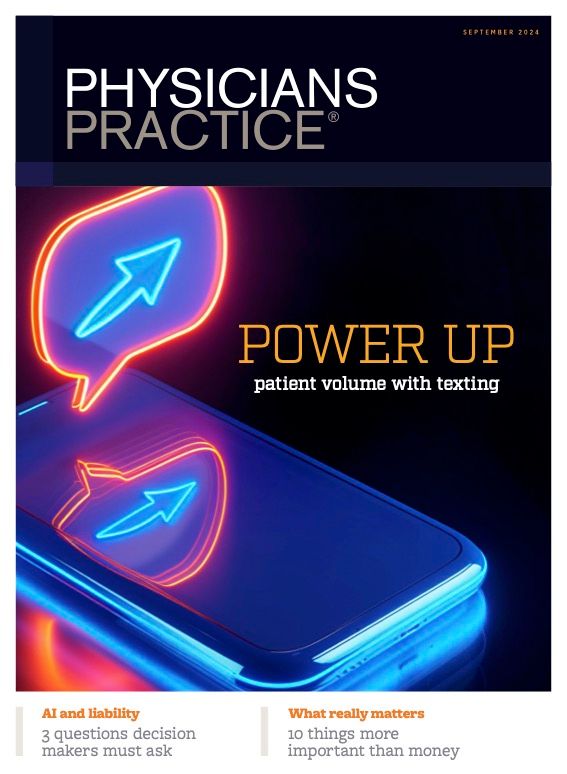Second half success: Texting to power patient volume
A highly effective and efficient way to engage with patients in danger of missing their recommended preventive services is text messaging.
© bnenin - stock.adobe.com

As we move into the latter half of the year, it's the perfect time to ramp up efforts to fill any gaps in care by getting patients in to receive their preventive services. Delivering preventive services (e.g., Medicare annual wellness visits, physicals, immunizations, mammograms, colorectal cancer screenings, many others) will help keep your patients healthy, more satisfied with their care, and more connected to your practice — all of which have elevated importance given that people are switching providers more often these days. Delivering these services, which are usually covered by insurance, before the end of the year will also help your practice avoid missing billable services and grow your revenue, enabling you to achieve a more successful year.
A highly effective and efficient way to engage with patients in danger of missing their recommended preventive services (a significant problem), make it easy for patients to schedule their appointments, and best ensure patients keep these appointments is with text messaging.
Here are some of the ways texting and text messaging software can enable you to increase booked appointments, manage recall campaigns (for those patients who have received preventive services from you before), and greatly reduce staff workload.
Automated and personalized communication. While you can manually send individual texts to patients concerning their preventive services, some software enables users to automate the delivery of text messages informing and reminding patients that it's time to schedule their preventive service.
You may also be able to easily personalize the message with the recipient's name and type of service they should be scheduling and receiving. Personalized messages increase engagement and make patients feel seen and valued.
Benefits and importance of appointment. Hit home the importance of scheduling and keeping a preventive service appointment by identifying key benefits of the service, such as identifying health risks, lowering healthcare expenses by avoiding costly visits and treatments, and receiving expert health guidance. Links can be included in a text message that take recipients to resources such as webpages and videos that further explain the importance of the preventive service.
Link to website/portal for ease of scheduling. If your practice enables patients to schedule their appointment through your website or a patient portal, including a link in the text to this technology can make it easy for patients to find the time that works well for them and take some scheduling work off your staff's plate.
Phone number for easy scheduling and questions. Including your phone number in a text can motivate patients to call to schedule their appointment or get any questions they have about the service answered so they will proceed with scheduling their appointment (e.g., How much will the service cost me?). Initiating the call only requires patients to click the number in the text. While patients may not answer a call from you, you are likely to answer any inbound calls to your practice.
Confirmation with date and calendar load. Once a patient schedules their appointment, a text — which may be automated — can go out that confirms the date and time for their service and includes a link they can click to add the appointment to their calendar. This further increases the likelihood that they will keep the appointment.
Reminders. As a patient's appointment date approaches, texts can remind the patient about the appointment, its date and time, its location, any preparation they must do, and anything they need to bring with them to the appointment. The message can include a phone number to call if patients need to cancel, which can help you avoid no-shows and fill open times in your schedule. Consistent communication helps keep patients on track with their healthcare needs.
Link to address. The day before the preventive service appointment, a text can go to patients that provides the address of your practice or where they should go for their service. Clicking this link should load the address into their preferred map/GPS app, making it easier for patients to navigate to the location and arrive on time.
Conversational texting to strengthen engagement. Conversational, two-way texting — which enables patients to reply to text messages — enhances efforts to motivate patients to schedule and keep their appointments. Two-way texts can ask patients if they would like to receive a call to schedule their preventive service or discuss it, ask patients to confirm their appointment or ask if they need to reschedule, and survey patients about their service experience, among other uses.
Target group for specific recall procedures. Texting is a great way to drive recall programs, such as those for colorectal cancer screening. A series of automated texts can help patients schedule their colonoscopy, remind patients about the required preparation steps and improve compliance, and help ensure patients arrive ready to undergo their screening.
Missed appointment. Despite your best efforts, patients will occasionally miss their appointments. A text message sent to these patients not long after can help reengage them, emphasize the importance of keeping appointments, and hopefully get them back on your schedule.
Send texts in preferred language. Some text messaging platforms enable users to assign a preferred language to a patient and communicate in this language. Research has shown that language barriers are linked to lower quality of care and poorer health outcomes, while patient dissatisfaction has been shown to be more prevalent among limited English proficiency patients than English-speaking patients.
Delivery reports and analytics. Select texting software generates reports that share the "who, why, and how" of your patient texting from delivery (i.e., confirmed receipt) to response as well as message history. With this information, you can make more informed decisions about how to proceed with outreach and engagement efforts, helping improve performance in these areas while enhancing staff productivity and optimizing staff time.
Maximizing patient volume with texting campaigns
All your patients need and will benefit from preventive services. The best way to connect with patients, encourage them to schedule their services, and make sure they arrive for their appointments is through texting. With low overall setup and outreach costs, together with unmatched engagement effectiveness, ease of sending messages, and ability to monitor outreach efforts, text messaging is the ideal communication method for interacting with most patients. If patients are behind on their preventive services for the year or should receive one or more services before we reach the end of 2024, the time for your practice to send them a text is now.
Brandon Daniell is co-founder and chief revenue officer of Dialog Health, a provider of a HIPAA-compliant, conversational two-way texting platform to organizations which they can leverage as a communication and engagement channel.
